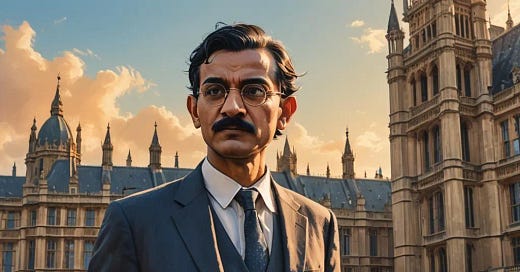In 1909, Gandhi returned to London. It was the third of his five trips there, and except for his years in law school, the longest. The struggles in South Africa were ongoing—Gandhi himself had been to jail three times—and since no relief was in sight, a deputation was sent to petition the British government directly.
Gandhi arrived in mid-July and began arranging meetings with the Colonial Office responsible for Indian affairs. The first of his two primary goals was a repeal of the Registration Act, which was the cause of much jail-going in South Africa.
The second was an objection to the statutory discrimination in South Africa’s immigration laws, which limited Asiatics to temporary permits. Gandhi, still a devout believer in the claim of equality among British subjects, strongly objected to this as a matter of principle. As a practical matter, he was willing to compromise, and offered to accept administrative discrimination, as long as no actual racial prohibition was recorded in the law books. Specifically, he wanted the government’s word that six highly educated Indians could be admitted as permanent residents each year. Alas, there was no compromise to be had.
Three other encounters influenced him on this visit. Just before he arrived, an Indian student in London had assassinated Sir William Curzon-Wyllie, igniting great controversy. Gandhi had a chance to meet with these Indian anarchists twice in October, and tried to persuade them of the superiority of nonviolence. They at least listened to him, because Gandhi led “practically the only example of Indians actually carrying on a sustained organized campaign for their rights. He was not merely a talker but an actor, a doer.”1
Second, the suffragette movement was in full swing. When a group of women were sentenced to jail in July, they began a hunger strike and were released in a few days. Gandhi attended a mass meeting soon after and learned more. In 1932, Gandhi would emulate this technique to influence election law with his Epic Fast from the Yeravda Prison.
Third, Gandhi began correspondence with Count Leo Tolstoy, for whom he would soon name Tolstoy Farm. A Christian anarchist and pacifist, Tolstoy had written A Letter to a Hindu, which argued that love was the weapon by which India could win their freedom from British rule. This resonated with Gandhi, who asked for permission to translate the letter into his native language and reprint it. Unfortunately, their brief correspondence ended the following year with Tolstoy’s death.
On November 6, 1909, Gandhi wrote several letters announcing that his petition to London had failed. A week later, he would leave, taking the time to write a book during the voyage back to South Africa. More about Hind Swaraj then.
Is there a type of discrimination you can tolerate as a practical matter, as long as it isn’t done on principle?
Gandhi in London (James Hunt, 1993) p. 125



